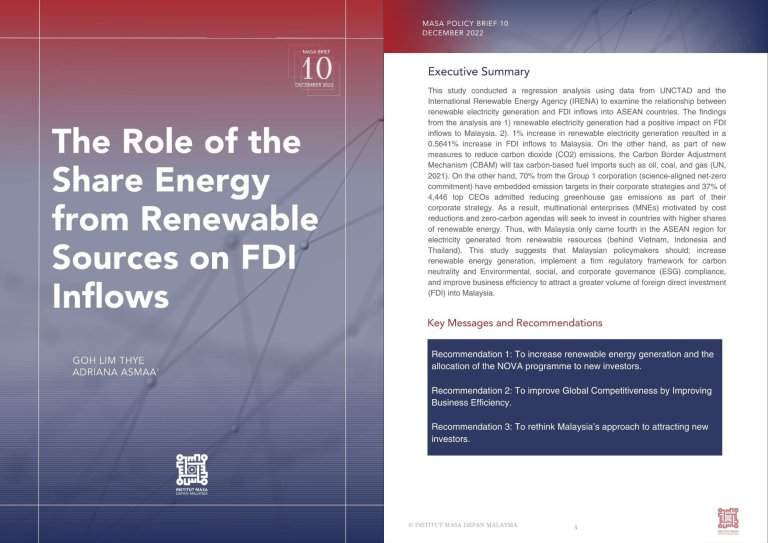This study conducted a regression analysis using data from UNCTAD and the International Renewable Energy Agency (IRENA) to examine the relationship between renewable electricity generation and FDI inflows into ASEAN countries. The findings from the analysis are 1) renewable electricity generation had a positive impact on FDI inflows to Malaysia. 2). 1% increase in renewable electricity generation resulted in a 0.5641% increase in FDI inflows to Malaysia. On the other hand, as part of new measures to reduce carbon dioxide (CO2) emissions, the Carbon Border Adjustment Mechanism (CBAM) will tax carbon-based fuel imports such as oil, coal, and gas (UN, 2021). On the other hand, 70% from the Group 1 corporation (science-aligned net-zero commitment) have embedded emission targets in their corporate strategies and 37% of 4,446 top CEOs admitted reducing greenhouse gas emissions as part of their corporate strategy. As a result, multinational enterprises (MNEs) motivated by cost reductions and zero-carbon agendas will seek to invest in countries with higher shares of renewable energy. Thus, with Malaysia only came fourth in the ASEAN region for electricity generated from renewable resources (behind Vietnam, Indonesia and Thailand). This study suggests that Malaysian policymakers should; increase renewable energy generation, implement a firm regulatory framework for carbon neutrality and Environmental, social, and corporate governance (ESG) compliance, and improve business efficiency to attract a greater volume of foreign direct investment (FDI) into Malaysia.
#10 : The Role of the Share Energy from Renewable Sources on FDI Inflows
- MASA Policy Development Programme, Policy Brief
Share Article
More Article
Article
By Muhammad Iman Khidir Tarmidzi Dalam struktur pentadbiran Malaysia, pihak berkuasa tempatan (PBT)...
Article
By Solahuddiin Ismail Mina Jangka hayat ketika lahir adalah satu anggaran purata umur...
Article
By Mohamad Fauzi Ahmad Meskipun ekonomi Malaysia bergantung pada permintaan domestik, sumbangan bumiputera...
Article
By Muhammad Iman Khidir Tarmidzi Siswazah muda dalam dekad kebelakangan ini, terperangkap dalam...
Article
By Muhammad Iman Khidir Tarmidzi Dalam struktur pentadbiran Malaysia, pihak berkuasa tempatan (PBT)...
Article
By Solahuddiin Ismail Mina Jangka hayat ketika lahir adalah satu anggaran purata umur...
Article
By Mohamad Fauzi Ahmad Meskipun ekonomi Malaysia bergantung pada permintaan domestik, sumbangan bumiputera...
Article
By Muhammad Iman Khidir Tarmidzi Siswazah muda dalam dekad kebelakangan ini, terperangkap dalam...
Article
By Muhammad Iman Khidir Tarmidzi Dalam struktur pentadbiran Malaysia, pihak berkuasa tempatan (PBT)...




